OCCUPY CENTRAL - DAY 31: Full coverage of the day’s events
Doubts over anti-Occupy petition
PUBLISHED : Tuesday, 28 October, 2014, 4:48am
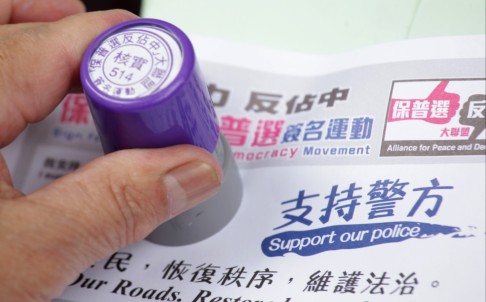
The Alliance said it had removed 675 fake names from the petition and that it would not be possible to ensure all the signatures were valid. Photo: Dickson Lee
The credibility of a petition by a group opposing democracy protesters has come under question after some signed up using fake names and false identity card numbers.
The petition, started on Saturday by the Alliance for Peace and Democracy, seeks to "support our police", "free our roads" and "restore law and order", all with the goal of ending the one-month democracy sit-ins. But some people - including a Post reporter and many residents who posted on Facebook - said they were allowed to sign using fake names and fake ID numbers.
The Alliance said it had removed 675 fake names from the petition and that it would not be possible to ensure all the signatures were valid. "But if there are some fake [names] that we failed to spot, we would just have to say thank you to them for signing up," spokesman Robert Chow Yung said. As of Monday night, 801,500 people had signed the petition, the Alliance said.
People can sign the petition in two ways - electronically and in person at public booths. Forms ask signatories for their names and identity card numbers and whether they are under or over 18. Those at booth are asked to sign a form vouching for their identities.
READ MORE: To view all the latest Occupy Central stories click here
The petition is scheduled to run through Sunday. Volunteers encourage people to sign, asking passers-by if they support the police.
Manlee Wong, a 26-year-old translator and journalist, said she signed using the fake name "Civil Nomination" and a fake ID number. "I had not expected there would be a proper verification system in place," she said. She provided images of her smartphone screen showing that she signed the petition online using fake information.
Chow said while his system could not screen out fake names, he stressed there was a system to check whether ID numbers were valid.
The online system was hacked on Saturday night, and has worked on and off since then. The server was paralysed yesterday afternoon.
At one booth in Causeway Bay yesterday, a Post reporter managed to sign the petition using a fake name and false identity card number.
Chow responded: "We have already had briefings with the volunteers that they must check people's identity cards."
This article appeared in the South China Morning Post print edition as Doubts over anti-Occupy petition
Hong Kong has spent billions on buying weapons from Britain
PUBLISHED : Tuesday, 28 October, 2014, 4:48am
Critics are calling for the UK to end all arms sales to Hong Kong immediately. Photo: Bloomberg
The British government's role in licensing the sale of arms to Hong Kong that could be used for "internal repression" has come under scrutiny.
John Stanley, chairman of the Committee on Arms Export Controls, has written to Business Secretary Vince Cable, asking him to clarify if "Made in the UK" tear gas canisters were used against pro-democracy protesters.
The letter, dated October 21, also contains a list of approved British export licences of lethal weapons to Hong Kong since 2012. Grenade launchers, mortar bombs, sniper rifles, machine guns and gun silencers are among the weapons, according to the committee's analysis.
Since 2008, £1.4 billion (HK$17.4 billion) worth of licences for arms and equipment sales to Hong Kong have been approved, according to official records.
A British government review of weapons licences to Hong Kong is under way - and could end these exports.
Stanley, a Conservative MP, also asked whether the government would continue to approve licences for the export of arms and equipment to Hong Kong, in light of the use of tear gas.
Cable has been asked to reply by October 30.
Official records show the Government Logistics Department (GLD) and the police bought at least 14,000 rounds of tear gas from Chemring Group, the British supplier, between 2011 and 2014. The sales are worth HK$13.8 million.
A spokeswoman at the UK's Business, Innovation and Skills department confirmed to the South China Morning Post that Hong Kong police had bought UK-exported weapons and arms.
Regina Ip Lau Suk-yee, who was Hong Kong's security minister from 1998 to 2003, said that various agencies in the city required guns, ammunition and other military hardware, including riot gear, for security reasons.
READ MORE: To view all the latest Occupy Central stories click here
A police spokeswoman said procurement of "equipment suitable for operational purposes" was within guidelines.
Customs and the Independent Commission Against Corruption released identical statements.
The Correctional Services Department said it imported weapons based on "operational needs" to control "chaotic situations". The GLD referred questions to the police, while the Immigration Department said it made purchases when items were "required and necessary."
A budget analysis of each department's general expenses, specialist supplies and equipment between 2008 and 2014 totals HK$20 billion, including HK$8 billion reserved for police, which could potentially be used to buy weapons. However, general expenses could also include simple photocopier and stationary purchases.
Some police expenditures went on US-imported ammunition worth US$10.05 million between 2005 and 2012, official records show.
Ip, an Executive Council member, said police were "responsible" for internal security, and weapons imports were "consistent with the export policies of the countries concerned".
She said since the 2001 terror attacks in the United States, the city had been asked to "step up protection" of foreign consulates against terror threats.
"That's the sort of situation that might require a military-grade [weapons] response," said Ip.
Critics are calling for the UK to end all arms sales to Hong Kong immediately.
Andrew Smith from the London-based Campaign Against Arms Trade, said that "for its size" Hong Kong buys "a lot" of weapons.
Hugo Swire, the Foreign Office minister responsible for Hong Kong affairs, said the foreign secretary and business secretary were likely to rule on a tear- gas ban soon.
He confirmed that the government had previously licensed exports of tear gas to Hong Kong.
The business ministry said it took arms export responsibilities "very seriously" and would take recent "disturbances" into account for future licence applications. "Military-rated goods for use by the police or other non-military end-users are not subject to sanction restrictions," a spokeswoman said.
This article appeared in the South China Morning Post print edition as Billions spent by city on arms from Britain
Student leader Alex Chow tells how he copes with parental pressure
Activist tells how 'pro-establishment moderate' family worry about his high profile in protests
PUBLISHED : Tuesday, 28 October, 2014, 4:48am
Alex Chow Yong-kang sees the lighter side of coping with public, family and political pressures at the Hong Kong Federation of Students office. Photo: Dickson Lee
It's not just politicians who are piling the pressure on student leader Alex Chow Yong-kang - he's also getting it in the neck from his parents.
The 24-year-old Federation of Students chief has become a household name and won a host of admirers since heading a class boycott that escalated into the start of the Occupy Central movement. But his family isn't entirely convinced, he revealed in an interview with the Post.
"I would describe my parents as pro-establishment moderates," Chow says, smiling. "They bombard me with phone messages … and send me articles that call for a halt to Occupy."
Just yesterday, his father, who works overseas, sent him an article by Professor Albert Chen Hung-yee, in which the legal scholar urged the students to stop the occupation.
"I won't reply to his message. I feel so much pressure!" Chow says, noting that his parents worry about his health, as well as the risk of waning public support.

Pressure also comes from pan-democratic politicians, he says. Some counsel moderation, while others favour radicalism.
"Some think you are too mild, but others say you are too radical. You have to discuss with others before making a move, which is necessary for a united front."
READ MORE: To view all the latest Occupy Central stories click here
Chow said his group had played the radical role in the past and enjoyed more freedom. But the act that, more than anything, kicked off the protests - a move to storm Civic Square, a forecourt at government headquarters that had been sealed off after emerging as a popular protest zone - was entirely "spontaneous".
Scenes of police using pepper spray and arresting students saw crowds gather and ultimately sparked the early launch of Occupy. "It's interesting to see how history is made of spontaneous events," Chow says.
Away from the protests, the University of Hong Kong student tends to keep his head down to avoid eye contact and the rows that follow. A video of a two-minute scolding he received from a woman at a bus stop was posted on YouTube, but Chow - who studies comparative literature and sociology - is positive about the experience.
"It's actually interesting to watch the video from a third-person perspective," Chow says. "I'm also sorry for the man who backed me and also got scolded."
A typical day begins with an 8am radio talk show, followed by an afternoon meeting with the federation and evening talks with other protest leaders. The day ends with a rally in Harcourt Road, Admiralty, though Chow sometimes heads to the Mong Kok protest zone "to show we have not abandoned them".
That leaves little time for studies, and Chow has deferred two courses - one on police power, which held particular interest to him - until next semester.
Chow jokes about the need to finish his essays, adding: "When my term with the federation ends in March, it may be time to pass the baton to my successor."
This article appeared in the South China Morning Post print edition as Student leader Chow feels parental pressure
Student leader urges pan-democrats to step up Occupy action as injunction extended
PUBLISHED : Tuesday, 28 October, 2014, 4:48am
\
Alex Chow said how long the occupation went on for would depend on the stamina of the protesters and whether the government made concessions on reform. Photo: Dickson Lee
A student protest leader has urged pan-democratic politicians to step up their involvement with the Occupy Cenrtal movement, including leading further dialogue with the government and setting up a referendum.
 Alex Chow Yong-kang made the plea a month into the protests, as the High Court kept in place injunctions against protesters and the boss of the stock exchange added his voice to calls for the activists to go home.
Alex Chow Yong-kang made the plea a month into the protests, as the High Court kept in place injunctions against protesters and the boss of the stock exchange added his voice to calls for the activists to go home.
"I do hope the pan-democratic lawmakers can take up the role for dialogue," said Chow, who joined last week's talks with officials as Federation of Students leader. "They don't need students' endorsement and as elected legislators they have legitimate claims to make a request for talks to the government."
In an interview with the Post, Chow said the federation was not keen on taking part in further talks itself after the first meeting a week ago failed to bear fruit.
Officials rejected a demand made by students during the talks that Hong Kong ask the national legislature to withdraw its August decision to set strict limits on nominations for the 2017 chief executive election. The officials would only agree to send a supplementary report to Beijing to reflect public sentiment.
"It is a division of labour," Chow said of the idea of politicians leading the talks. "If politicians can steer the talk, students can focus on communicating to protesters in the streets and understanding their demands."
He said how long the occupation went on for would depend on the stamina of the protesters and whether the government made concessions on reform.
And he admitted students and other Occupy organisers made an error of judgment in attempting to set up a vote of protest participants on Sunday. The ballot, on various aspects of political reform, was scrapped after disagreements among protesters.
Chow backed the idea of pan-democratic lawmakers resigning to force by-elections, which would serve as a "de facto referendum" on reform.
The idea - similar to a mass resignation over political reform in 2010 - was also raised by Occupy co-founder Benny Tai Yiu-ting, who said volunteers were organising "chat groups" at protest sites to debate the way forward. A mass resignation or a poll similar to the unofficial referendum Occupy ran in June were among the options. "The vote is only a tool. We will also discuss the motion for voting," Tai said.
READ MORE: To view all the latest Occupy Central stories click here
Democratic Party lawmaker Albert Ho Chun-yan, identified by the federation as a possible candidate to resign, said the pan-democratic camp would need to discuss the idea of resignation and how to pursue dialogue.
Meanwhile, Hong Kong Exchanges and Clearing chief executive Charles Li Xiaojia said a retreat by the protesters could be "a glorious move", adding that it was time for students to listen to the thoughts of others.
And a High Court judge deferred a decision on whether to uphold an injunction ordering the protesters in Admiralty and Mong Kok to disperse, but said the court order would remain in place until he made his decision.
This article appeared in the South China Morning Post print edition as Student leader in plea to pan-dems
Credit police for showing restraint
PUBLISHED : Tuesday, 28 October, 2014, 5:28am
Police officers arrest an alleged anti-Occupy agent provocateur in Mong Kok. Photo: EPA
Whenever a campaign over an issue that divides society has spilled onto the streets in mass action, it has led to debate whether the police response is proportionate and appropriate. With the troubles on our city's streets now in their fifth week, police find it difficult to strike a balance between free speech and public order that satisfies all.
Now a spirited and concerted defence of the force's performance has emerged in media coverage. This follows incidents that raised questions about the city's reputation for peaceful protest and tolerance, such as telecast video of plain-clothes officers taking away and assaulting a protester, and a telephone message threatening physical harm to the daughter of a front-line police officer. Both incidents are to be condemned as unacceptable. More recently, journalist groups have demanded immediate action from the police commissioner after four more colleagues were assaulted at an anti-Occupy Central rally over the weekend, bringing the number who have faced various attacks to 24. The journalists' association has rightly condemned them as attacks on our core value of press freedom. We trust the police will stand by a pledge to take impartial enforcement action.
That said, the police have generally acquitted themselves well in a difficult situation. They have been caught in the middle between illegal civil disobedience over a political issue and a government that will not yield. Unlike the protagonists, they have no choice but to be there. They are sworn to uphold and enforce the law. However lofty the ideals of the protesters, they are breaking the law. To be sure, the issue is not black and white. Police may have been following orders in using tear gas weeks ago, but it was controversial. However, the fact it is now perceived that there is a need to rally support for a force with a widely envied reputation shows the pressure they are under.
READ MORE: To view all the latest Occupy Central stories click here
Regrettably, much of the verbal abuse and other offensive behaviour to which police have been subject has been gratuitous, and adds to the psychological stress of civil confrontation. One clip of a video released yesterday by the security minister, showing protesters using foul language, is evidence of that. It is well documented that the authorities in other jurisdictions that enshrine free speech would have ordered tougher action by now. In the circumstances, our police deserve credit for professional restraint and discipline.
This article appeared in the South China Morning Post print edition as Credit police for showing restraint
PUBLISHED : Tuesday, 28 October, 2014, 12:45pm
Let our children think, talk and argue over Occupy protests
Kelly Yang says the Occupy protest offers the chance of real-world learning at its best, not least because of its importance for Hong Kong
As teachers, it is our job to prepare students to think critically. This means understanding and analysing both sides. Photo: AFP
As the protests continue, with no end in sight, it's been a very interesting month for Hong Kong teachers. Occupy has galvanised students' interest in politics. I have led debate after debate, with rooms packed full of secondary students.
One said, "These [student protesters] are total hypocrites. They want democracy. Yet they refuse to abide by the rule of law. If they really care about Hong Kong and their future, they should go back to the classroom and prepare for their future like a real student." Another retorted, "But what's the point of preparing for the future when that future is not bright?"
As a teacher, arguments over democracy, rather than whether Miley Cyrus is still cool, make you feel excited, whatever your politics. This is real-world learning at its finest. No longer are debate motions simply vague, abstract arguments. No longer are essays concocted by teachers, and students are actually happy to write them.
As soon as Occupy began, I asked all my students whether their teachers had talked to them about Occupy. What was their take on it? What did the students think? To my surprise, many said they hadn't talked about it at school. Apparently, it was business as usual at many establishments.
I understand the hesitation to talk about Occupy. It is such a heated topic, just how are we teachers supposed to discuss it without injecting our own views, even accidentally? And if do that, are we unfairly imposing these views on students?
But the result of this silence has not been apathy, but more interest from students, who want to know what is happening in their own city. Even five-year-olds wanted to know. One asked me: "Why can people sit in the middle of the street?"
I racked my brain to come up with ways to explain "right", "vote", and "leader" to him. When I finished, he nodded and started to walk away. Then, he stopped and asked, "But to sit on the street, isn't that … naughty?"
It is naughty. It's also complicated. And it's this complication that excites me as a teacher, because nothing makes for a better discussion.
A week ago, two students looked at me nervously throughout the entire lesson. They told me their school teacher had showed the class a column I had written on Occupy Central, in which I said that the movement may be hurting a lot of ordinary Hongkongers. Their teacher completely disagreed with what I wrote and spent the better half of the lesson trashing both me and the piece.
When I heard this, I was not angry. If anything, I was excited, because it meant teachers were at least talking about the issues. As teachers, it's our job to prepare students to think critically. This means understanding and analysing both sides. It means treating disagreement gracefully and thoughtfully, because in disagreement there may actually be wisdom. To get there, we, as teachers, must teach the lesson that matters for Hong Kong. How we teach this will shape the city's future.
Kelly Yang teaches writing at The Kelly Yang Project, an after-school centre for writing and debate in Hong Kong. She is a graduate of UC Berkeley and Harvard Law School.http://www.kellyyang.edu.hk/kelly/
This article appeared in the South China Morning Post print edition as Live lessons
Resolute Occupy protesters raise umbrellas to commemorate firing of tear gas
PUBLISHED : Tuesday, 28 October, 2014, 6:10pm
Protester hold their umbrellas on Harcourt Road at 6pm. Photo: SCMP Pictures
Hundreds of people gathered on Harcourt Road in the area now dubbed Umbrella Square to commemorate the firing of tear gas at protesters by police one month ago – a major turning point for the pro-democracy movement.
Many protesters interviewed over the past month have said the use of tear gas had first driven them out onto the streets. The crowd on Harcourt Road held up their umbrellas for 87 seconds, one second for every canister of tear gas that police said they fired on September 28.
The start of the ceremony included a surprise appearance by singer and actress Deanie Ip Tak-Han. Ip said she couldn’t fathom why the police fired tear gas at the crowd. "They hate you, thinking you’re traitors and they’re afraid of you poking them with umbrellas," she said, drawing laughter from the crowd.
Protesters camped at sites around Hong Kong say they are determined to stay as the street protests enter their second month, but some have adjusted their goals – while others crave greater unity within the movement.
In Admiralty, 33-year-old Dan Yip said he has no intention of leaving, but his ambitions for the protest have shifted.
“We’re still going strong. If this lasts until Christmas and the new year, so be it,” said Yip, who teaches English literature at the Open University.
“When people bring us supplies, I often ask them what they would like the government to do right away, and most say it should do away with functional constituencies. Civil nomination has to be the second or third goal; getting rid of functional constituencies is the first.”
Half of the city’s 70 lawmakers are elected by functional constituencies, mostly based on trade and professional sectors. For a measure to pass in the Legislative Council, it must get majority support from both directly elected lawmakers and functional constituency lawmakers.
Yip said protesters now take turns in staying overnight at the camp, after being there around the clock in the early days.
Third-year university student Leung Wai-sin said she skipped classes at first to be in Admiralty, but now comes in her free time. She has also shifted her goal for the protest.
“At first I really was fighting for the right to nominate chief executive candidates, but I’ve learned to expect less and less from the government as the protest continued,” she said.
Now she will consider leaving the camp if the government submits an additional report to the national legislature to objectively portray how Hongkongers feel about democracy – without covering up what it doesn’t like.
She says the protesters need to talk more often about what they want, making reference to a hastily cancelled public vote on Sunday.
“Take the vote that didn’t happen – people didn’t like that because the Federation of Students came up with choices without much of a discussion,” she said. “We need more discussion about what protesters want the government to do, at the very least, instead of just chanting slogans.”
Chan Siu-lung, who has just invested in a tent with friends, felt the protesters need to do more to explain to the rest of society what they are doing.
“They may only see how we’re disrupting their lives, without them knowing exactly what we’re fighting for,” said the 25-year-old, who works for the recreation department of a clubhouse.
“We try not to bring up the protests at work, but when we were all eating together, one colleague said that protesters are just getting in the way of people making a living. So I quickly explained to her why I was doing this, and she listened and the conversation remained friendly.”
Social worker Homer Choi, 30, who first took to the streets on September 29, said he would like to see a stronger sense of unity among protesters going forward.
“There should be more meetings among protesters from different sites,” said Choi, who has based himself at the Mong Kok camp on Nathan Road.
He said the movement should be about peace, love and the willingness to listen to others.
But he stressed that the sporadic violence in Mong Kok was not caused by protesters, but by those who had infiltrated their ranks intent on causing trouble.
Chou said he would retreat when the trio of Occupy Central leaders – Benny Tai Yiu-ting, Dr Chan Kin-man and Reverend Chu Yiu-ming – and student leaders recommended to do so.
He felt the protest leaders were doing a better job than the government has done in recent years.
One protester, an illustrator surnamed Lam, said he wanted to leave now.
“But the government still has not given us a response politically. Instead, it blamed us for causing security problems,” he said.
Lam said that there was nothing else that the protesters could do except to continue their sit-in. It is all up to the government from this point, he said.
“The government is the party responsible for taking care of the economy and politics, not the students nor the [Occupy] trio,” he added.
Lam said he would not leave until the government had come up with a proposal which he deems acceptable.
Protesters want a rethink of Basic Law bargain between Communist Party and big business
John Burns says the injustices of the current system make it untenable
PUBLISHED : Tuesday, 28 October, 2014, 12:55pm
The protests have shone a light on the injustices of the Basic Law bargain. Photo: AFP
Chief Executive Leung Chun-ying's comments in the international media implying that government in Hong Kong must be protected from populism is a timely reminder of the bargain the Chinese Communist Party struck with big business in the 1980s that was then codified in the Basic Law.
Leung said that "you have to take care of all the sectors in Hong Kong … and if it's entirely a numbers game and numeric representation, then obviously you would be talking to half of the people in Hong Kong who earn less than US$1,800 a month". Apparently, enfranchising the poor is unacceptable.
In the Basic Law bargain, the party offered big business in Hong Kong economic benefits on the mainland and business-friendly policies in Hong Kong in exchange for loyally supporting party policies on and in Hong Kong. The essence of the bargain had nothing to do with patriotism, although that would be a plus.
READ MORE: To view all the latest Occupy Central stories click here
In the years following the promulgation of the Basic Law, big business in Hong Kong cashed in on investment opportunities on the mainland facilitated by the party.
To deliver on its promise, the party established a government structure that significantly advantaged big business and the professions through the functional constituency system in the Legislative Council. The party also structured the regime for nominating the chief executive in such a way that big business and the party could determine the final nomination outcome.
Creating a few non-big business/professional functional constituencies served only to demonstrate to the public that representation was somehow balanced.
According to the bargain, big business was to deliver strong support for the party's Hong Kong policies. That could be achieved through supporting the government in Legco, and supporting the party's united front activities in the city. For the most part, both sides have kept their side of the bargain. The Basic Law bargain was crafted following several decades of economic growth for the poor and middle class to advance. Since then, fate has not been so kind. Slower growth, skyrocketing housing prices and increased competition have reduced opportunities for upward mobility among ordinary Hongkongers. The local population is now better educated and increasingly aware they have been disenfranchised.
No promise of united-front-style universal suffrage can address the fundamental injustice of the current political system that prevents most of the population from having a say in key political decisions.
This brings us to the current impasse. When Tung Chee-hwa says the protesters are dividing the city, he is of course only partially correct. The city has long been divided by class politics in a political system that favours the interests of big business. The protests have shone a light on the injustices of the Basic Law bargain.
Student and Occupy protesters are asking to renegotiate the bargain to allow all sectors to participate on an equal footing. Rule by an alliance of the party and big business, they say, is no longer legitimate. To influence outcomes in the future, big business should be required to play the game of politics, as is done everywhere else, not have business-friendly outcomes delivered on a plate by the Communist Party.
This issue goes to the core of our political system. To address this, the state must establish a political system in Hong Kong that does not favour one sector (big business) over others. A good place to start would be to reform the nominating committee for the 2017 chief executive election to give all citizens a voice, a process that could see the abolition of functional constituencies.
John P. Burns is dean of social sciences at the University of Hong Kong
This article appeared in the South China Morning Post print edition as Rethink Basic Law bargain favouring big business
For 'one country, two systems' to work, Beijing needs inspired Hong Kong leadership
Tom Plate says a nomination procedure that would throw up a leader like Leung needs an overhaul
PUBLISHED : Tuesday, 28 October, 2014, 1:01pm
Doctored photos of Chinese President Xi Jinping being distributed at a protest site. Photo: AP
History rarely moves in ways simple enough to be wholly comprehensible at the time. Even our best journalism takes but close-up snapshots - never the long view. What observers and commentators make of what is happening in Hong Kong is not, in any complete sense, what history will eventually make of it. Historical meaning is elusive without the perspective of time, which is precisely what we don't have at the very moment we need it most.
So the question becomes what is to be concluded about Hong Kong right now, in the unfocused, semi-darkness of the moment? Some observers view the struggle of the "pro-democracy" street protesters as the classic diorama of good guys against bad guys. This is obviously simplistic but emotionally appealing. Others view the recent turmoil as the breakdown of law and order and the erosion of a decent respect for legitimate authority.
This is factually correct, but is emotionally unappealing. And it is beside the point, which is: where do Beijing and Hong Kong go from here and in what civilised manner do they do it?
One has the sense that this really is new political terrain - brilliant Hong Kong is sui generis, one of a kind, resistant to obvious analogies, a situation not really like any other. Its demographics and geography make it a little gem, a place as close physically to physical mainland China as you can get without falling over into Guangdong, and yet for a long time sovereign power was absurdly distant.
READ MORE: To view all the latest Occupy Central stories click here
After the sensible Margaret Thatcher government accepted that it had to give it back, the sensible Deng Xiaoping imagined a Hong Kong embraced without rancour or fuss into the overall Chinese family, even if it proved the case that this spoiled prodigy would incessantly demand special treats. Which, more or less, it has, more or less incessantly.
Were Deng alive today, would he take the rod to the spoiled child? Or shake his head knowingly, the uncle of eternal patience? So far, at least, the Beijing of today has mostly left the official reacting to the local authorities, even as students, among others, continue to play in the streets, freeze traffic, disrupt the adult economy and disrupt domestic tranquillity. Would such public space activity be so patiently and lengthily permitted in Los Angeles, where I reside?
Beijing is understandably perturbed by the protest against its judgment regarding the rules for the 2017 election, in which everyone will be able to vote but not everyone will be able to run. It regards its rule-making as well within its sovereign power.
Pushing negotiations with the upstart protesters down to the working level of the special administrative region itself is tactically correct and within the markers of "one country, two systems", the governing code endorsed by the late Deng which, though battered, is anything but dead. But there is an operational problem: the local government would appear to have lost too much moral - or at least persuasive - authority.
Chief Executive Leung Chun-ying, who took office in 2012 and early on made some good, tough policy decisions, has inadvertently ratcheted up the tensions. Certainly, his public comment in which he openly worried over the consequences of permitting the poor to have as much influence over public policy as the elite was not helpful or calming. It is hard to imagine any responsible Communist Party official in Beijing uttering something like that.
Beijing might quietly want to note that Leung attained the highest office in Hong Kong via an election nominating process that in part will carry through to 2017, despite the grandiose and welcome opening to universal voting. The danger with that is that Hong Kong, and Beijing, may never gain the kind of inspired leadership both deserve and the tricky "one country, two systems" requires.
Perhaps the process of selection should get a second look. A plenary session of review, perhaps a community-at-large process taking even many months, hosted at one of Hong Kong's universities, would hardly seem more of a waste of time, energy and spirit than these stupid and dispiriting street circuses.
To this end, why not ask Tung Chee-hwa, the city's first chief executive, to chair the review? With his timely and obviously well-intentioned calls for calm and reason, Tung, who - crucially - retains Beijing's trust, offers the people of Hong Kong very good reason indeed to listen to him.
There may be some room for navigation between what Beijing has proposed and what some Hong Kong people prefer. Surely the time for a higher level of calm and consensus is ripe. The territory and mother China should be working together on ameliorating the social and economic pressures threatening to pull Hong Kong down far more dramatically and dangerously than today's governance dispute. Hong Kong should get its act together and cut down on the self-flagellations.
Professor Tom Plate, distinguished scholar of Asian and Pacific Studies at Loyola Marymount University in Los Angeles, is the author of In the Middle of China's Future. Copyright: Pacific Perspectives Media Centre
This article appeared in the South China Morning Post print edition as For 'one country, two systems' to work, Beijing needs inspired HK leadership
Hong Kong government can make a new case to Beijing on electoral reform
Chris Patten calls on the Hong Kong government to submit a new report to Beijing that paves the way to a directly elected legislature and a broader electoral base for the nominating committee
PUBLISHED : Tuesday, 28 October, 2014, 1:08pm
The government's report to Beijing plainly understated the degree of public support for change.
Hong Kong's democracy movement has gained admiration worldwide. The principles, decency and behaviour of its youthful vanguard inspire confidence in the qualities of the generation that one day will run the great city. That said, it is time to move on to a sensible endgame.
The longer the stand-off between Hong Kong's chief executive and the demonstrators continues, the more likely it is that individual citizens - and Hong Kong itself - will be hurt. The Hong Kong government should demonstrate some statesmanship, which the so-called "umbrella movement" - occupying the moral high ground and not wishing to risk losing public support - would surely reciprocate. A substantive and successful dialogue with the government would not require the protesters to call off their campaign for democracy; it would simply end the current phase of a campaign that eventually will succeed.
Despite their protestations to the contrary, Chief Executive Leung Chun-ying and his government have considerable room for manoeuvre. As many Hong Kong citizens have argued, the Chinese government's current position is based on a report, submitted by Leung's officials, which purported to reflect accurately the outcome of local consultations on constitutional development.
But the report plainly understated the degree of public support for change. Given what has happened in the past few weeks, Leung could quite properly give a new report to the authorities in Beijing focusing on two issues not proscribed by the Basic Law.
READ MORE: To view all the latest Occupy Central stories click here
The first issue concerns not just the immediate question of the terms on which the chief executive will be elected in 2017, but also how the Legislative Council should be elected in 2016 and after. The procedure is largely a matter for the Hong Kong government to decide.
It is surprising that 17 years after the handover of sovereignty, Hong Kong still does not have a directly elected legislature. In December 1992, Margaret Thatcher suggested in a speech in the House of Lords that, if all went well, Hong Kong could have universal suffrage by 2007.
Unfortunately, all has not gone well. The legislature today comprises a mix of directly elected members and those representing functional constituencies: corporate interests and groups of employees. Some civic groups have advocated increasing the number of directly elected legislators and opening up the functional constituencies to broader electorates. Moreover, the brake that the functional constituencies can put on legislation should be scrapped, leaving decisions to a simple majority. This could be accompanied by a pledge to create a legislature composed entirely of directly elected members in 2020.
The second issue concerns the composition and voting rules of the hand-picked 1,200-member nominating committee for the chief executive election. The current proposed arrangements would permit the Chinese government to veto any candidate that it did not like, prompting criticism that what is on offer is an Iranian-style election: "You can vote for anyone we choose." The Hong Kong government could call for changes to increase the openness and fairness by which the chief executive is chosen, without abandoning its current method in favour of universal suffrage.
According to the Basic Law, the committee should be "broadly representative" - a provision that the composition of the Election Committee, on which the nominating committee will be based, violates. Its membership is chosen by only 7 per cent of the total Hong Kong electorate, and its voting procedures seek to prevent the nomination of any candidates who may harbour democratic sympathies.
Since 1997, 55-61 per cent of voters have chosen democratic candidates in Legco elections. The last time a slightly smaller Election Committee met (to choose Leung), less restrictive constraints on candidate selection were in place, and the leader of the Democratic Party was able to be nominated (though he still received less than 7 per cent of the vote).
So Leung and his team should put forward proposals to broaden the electoral base of the nominating committee and open up the nominating process for candidates. There are plenty of recommendations from civil society groups about how to accomplish these objectives. Both sides will need to give a little to prevent the confrontation in the streets from escalating, with the police forced to provide a substitute for a sensible policy.
The British government has said that it is important that "the people of Hong Kong have a genuine choice". Leung and his colleagues can give them one. This would not be all that the umbrella movement has demanded, but it should encourage the protesters to reach a compromise without departing from their longer-term goal.
That is why Leung should embrace dialogue and compromise. Even a ruler whose mandate comes from heaven should heed the words of the Confucian sage Mencius: "Heaven sees with the eyes of its people. Heaven hears with the ears of its people."
Chris Patten, the last British governor of Hong Kong, is currently chancellor of the University of Oxford. Copyright: Project Syndicate
This article appeared in the South China Morning Post print edition as Core issues
Resolute Occupy protesters raise umbrellas to commemorate firing of tear gas
A month after humble item became their shield and symbol, protesters hold them up for 87 seconds to mark firing of 87 rounds of tear gas
PUBLISHED : Tuesday, 28 October, 2014, 6:10pm
Occupy protesters in Admiralty observe an 87-second silence to mark a month since police fired 87 volleys of tear gas. Photo: Felix Wong
A sea of umbrellas covered all three Occupy Central protest sites yesterday as thousands observed an 87-second silence to mark one month since police fired 87 rounds of tear gas to disperse crowds at the start of the pro-democracy rallies.
Protest leaders hope the ceremonies will inject fresh momentum into their civil disobedience campaign and reverse its loss of direction and leadership. Protesters on the ground are also contemplating what to do, with most determined to stay put.
Watch: Hong Kong protesters mark one month of Umbrella Movement
Yesterday, silence descended on the sites in Admiralty, Causeway Bay and Mong Kok at 5.57pm - the time when riot police fired the first canisters of tear gas in Admiralty on September 28 after extensive use of pepper spray failed to bring protesters under control.
At the time, protesters used umbrellas to shield themselves, turning the humble item into the symbol of Occupy Central and prompting overseas media to dub it the "umbrella movement".
READ MORE: To view all the latest Occupy Central stories click here
At the spot near government headquarters where the first canisters were fired, thousands of protesters and their supporters held up umbrellas for 87 seconds.
Then they broke their silence by chanting: "Democracy fears no tear gas. Hong Kong will not be the same again."
The atmosphere was more festive at the other two sites. About 80 protesters sang and danced around the occupied section of Yee Wo Street, Causeway Bay, while onlookers in Nathan Road, Mong Kok, were treated to an umbrella dance choreographed by Mui Cheuk-yin.
But differences in opinion continued to divide protest leaders and demonstrators.
On Sunday, an electronic ballot on the way forward was abruptly cancelled after the protest leaders could not agree on the issues to be voted on.
Some protesters hinted at a shifting of goals.
In Admiralty, Open University lecturer Dan Yip said more protesters were now asking to scrap the Legislative Council's functional constituency seats first, before moving on to the longer-term goal of seeking public nomination of chief executive candidates - one of Occupy's original demands.
Half of the legislature's 70 seats are returned by functional constituencies, mostly based on trades and professional sectors.
To pass, any motion initiated by lawmakers must receive majority support from both geographical constituency and functional constituency legislators.
Speaking last night in Admiralty, Occupy co-founder Benny Tai Yiu-ting urged supporters to think how to bring the movement forward.
"First, we have to think how to gain support from people outside the protest sites. Second, we have to think how to consolidate what we have already achieved and push forward Hong Kong's democratic movement."
Also yesterday, a 50-year-old man turned himself in to police and was arrested over an assault in Tsim Sha Tsui on Saturday. Four journalists were attacked while covering an anti-Occupy rally. The man, suspected to have pulled the tie of a TVB reporter, was in custody last night. Two other men arrested in connection with the case have been released on police bail.
This article appeared in the South China Morning Post print edition as Umbrella moment
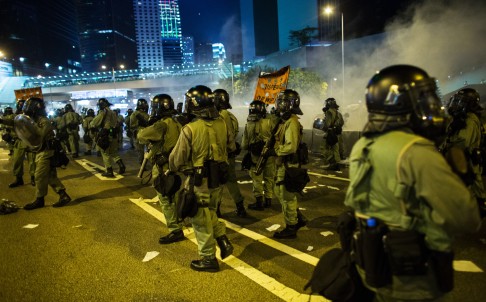

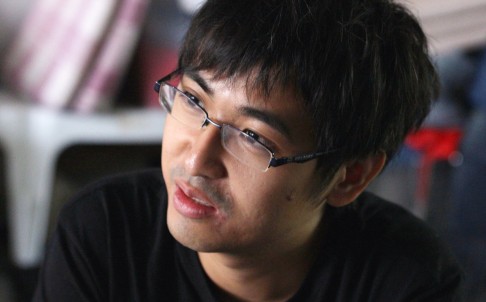
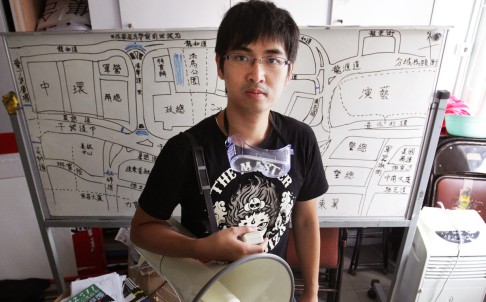
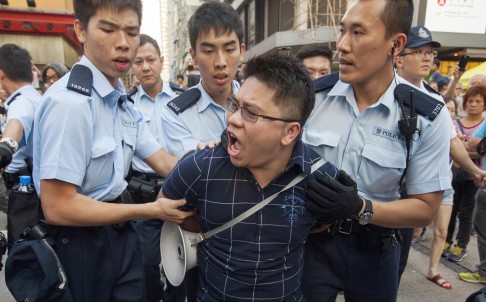

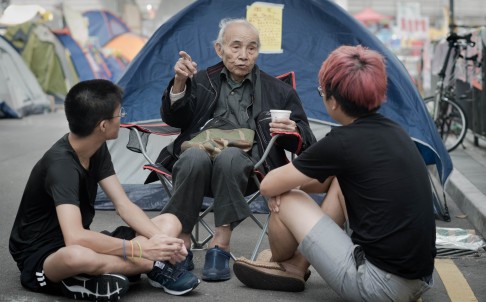

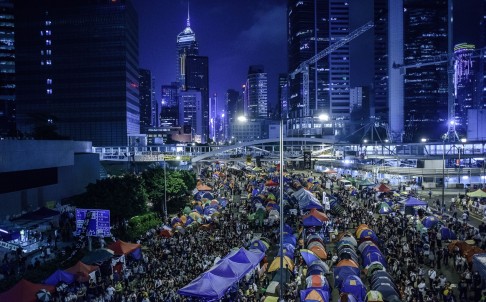
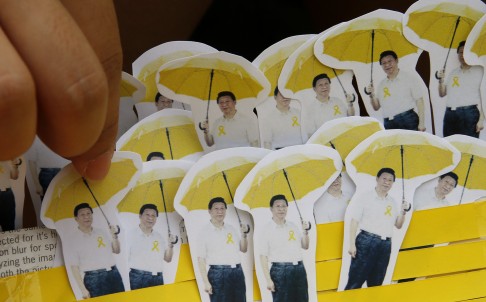
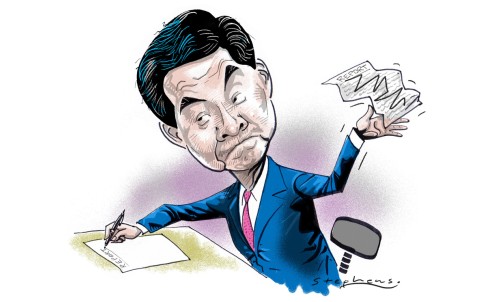
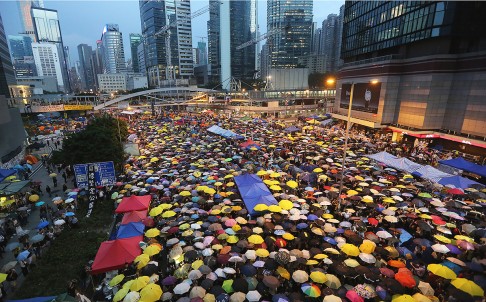
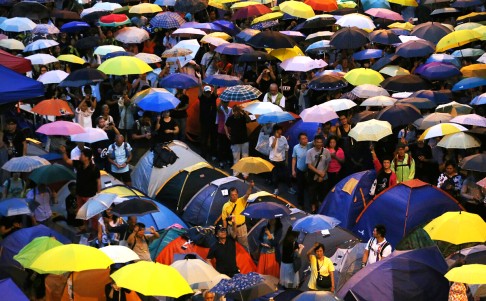
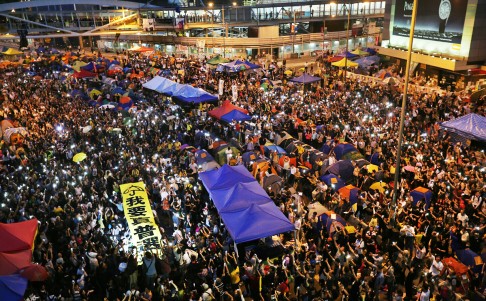
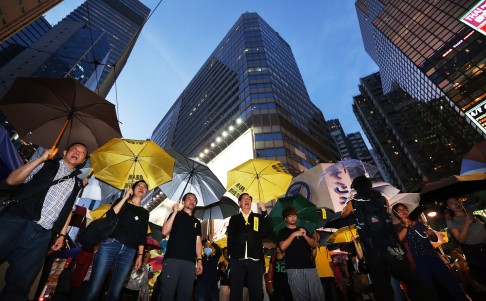
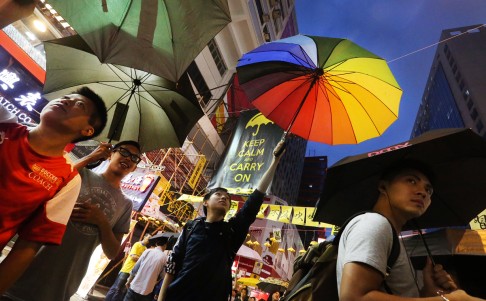
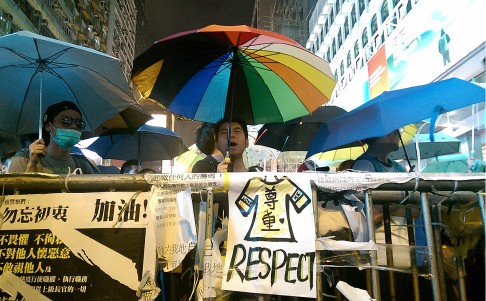
沒有留言:
張貼留言